- Home
- Elizabeth E. Wein
A Coalition of Lions Page 14
A Coalition of Lions Read online
Page 14
“Which way have you come?” I asked him. “Where was the lair?”
“It is only a little distance,” Telemakos said angrily, his slate blue eyes gone smoky and cold. “You need not all make such a fuss. They are a gift for the emperor. I would not let them hurt me.”
Oh—fearless, as in my dreams.
The great, golden kits writhed and swarmed over his shoulders, struggling to break free. Telemakos held them as firmly as he held Candake’s cats, and with as little regard for the strength of their claws.
Medraut laid down his spear and knelt to look into his son’s eyes. Whatever Telemakos saw there was so fearsome that he burst into tears.
“Do not kill them,” he begged. “I will let them go, if I must, but don’t kill them. I was only trying to bless the kingship.”
“You mad thing!” I exclaimed, half inclined to laugh. “What of their mother? She will come hunting for them! What if she had caught you alone?”
Medraut saw the real danger first. He snatched for the spear that lay at his side, and stumbled to gain his feet. The knee that he had broken earlier that year collapsed beneath him; he missed the spear and missed his footing. In the moment before the lioness was upon us, he cried out in a terrible voice, “’Ware Telemakos!”
One of the brothers Anbessa threw himself at the child. They went down together in a flash of gold and dark limbs. I could not tell whether it was Priamos or Abreha.
My bow was in my hand unbidden, and I set arrow upon arrow in the lion’s throat. I shot as Medraut shoots, coldly, accurately; but my bow was not strong enough to kill her outright. The man who had flung his body over Telemakos lay crouched with his narrow hands locked behind his neck, in the desperate hope that if he were attacked he would lose only his hands and not his life. The lioness stood over the man and the child for a fragment of a second, bewildered by the stinging arrows in her throat, scenting the kits.
Then Constantine gave a great cry of fear and anger, and lifted his spear and caught the snarling creature through her breastbone. I shot another arrow into her throat, so close to her now that the shaft buried itself to the fletching. Between spear thrust and arrow’s point we took her at last, between us, Constantine and I.
Constantine worked his spear out of the heavy, golden carcass and stood panting, stunned, his hands smeared with blood. The rest of us flung ourselves at the cowering man and boy. I should say the cowering man, for the child was not in the least cowed. He still clung to his lion cubs as though he would never let them go. They had torn his shirt to ribbons. Medraut, moving with his own recovered leonine stealth and speed, plucked the cubs from Telemakos’s hands by the backs of their necks. The great cats went limp, as kittens do when carried so. They were enormous kittens.
It was Priamos, of course Priamos, who had chanced being rent to pieces in defense of my nephew. The cubs had torn long scratches across his face, traveling from the bridge of his nose over his cheek and down his throat. Abreha let the horses go, now that the danger was past, and crouched at his brother’s side searching for any more serious injury. I snatched Telemakos close against me, and he wound beguiling arms about my neck.
“Can I keep them? I mean, can we keep them? May I present them to the emperor?”
Medraut stood helplessly holding a lion cub at arm’s length in either hand. Constantine rubbed one hand against his sandy forehead and left a great red streak there.
“Well, so it was you,” he said wearily to Priamos. “I wondered which of you could be so selfless.”
“You did not know—” said Priamos, and stopped. Then his flyaway hornbill’s tongue, and perhaps the shock of expecting the perilous teeth to close on the back of his neck, overrode all reason or gratitude in him.
“You did not know! You did not know who you were defending! If you had known it was me, you wouldn’t have done anything! You did not know, you did not care!”
“By God, I did not care!” cried Constantine. “Why, it was either you or the Himyarite king! How should I stand by and watch either one of you have your throat torn out?”
Priamos rose to his knees, shaking off Abreha’s concerned touch. He offered Constantine his open hand, as though holding something precious and invisible in its cup. His pale palm was still faintly striped with the marks of the beating he had taken in the season just past.
“My lord. My king,” he breathed. “Forgive me. I owe you my life and my allegiance.” He closed his eyes. “I beg your forgiveness.”
Constantine paused, looking down at the ambassador’s bowed head and open hand.
“You shall have mine when I have yours,” he said then, and took his rival’s hand.
He raised Priamos to his feet. They stood firm in their shared grip, gazing down at their clasped hands, pale and dark.
“You are welcome to our coalition,” Priamos said at last.
Constantine looked over his shoulder at me, and smiled.
“You noble pair of predators,” I cried, in high spirit. “You are both welcome to my pride.”
“Look, Gebre Meskal is coming,” said Telemakos, and struggled free of my embrace.
Abreha took one of the cubs from Medraut. In the exchange, as they both stood smiling with their heads bent over the young lions, I saw all that Medraut might have been.
Telemakos stood his ground before them, desperate. “Please, please don’t let them go. Let me present them to the emperor, oh, please, sir.”
He was all that Medraut might yet be.
Medraut nodded once to Telemakos. Abreha said to the child, “Stay calm and wait.”
Telemakos did so. He loped at Medraut’s side with his mouth pressed shut, occasionally glancing over at the lion cubs and breaking into his secretive, incomplete smile, but mostly focused on the meeting with the young emperor. When our parties came together, he knelt before Gebre Meskal with princely dignity, his impossible hair gleaming bright as any crown, and said, “Your Highness, I offer you these gifts to grace your palace as a symbol of your kingship.”
Then he was on his feet, dragging forward by the elbow first Medraut, and then Abreha. They held forth the cubs.
“I have named them Solomon and Sheba,” Telemakos proclaimed regally.
He held out his arms to Medraut in great longing; and Medraut, all the ice in his veins melting at this entreaty, gave him the cub. Telemakos held it cradled as if it were a house cat and offered it to the young emperor.
“This one is Sheba,” he said. “Keep them well. You must not chain them.”
“I will not, Lij Telemakos,” said the tame lion.
“Kind thought,” said Priamos, as we watched them construct a hutch for the cubs to be carried in. “It was a kind thought.”
Priamos had endured a thorough treatment with salt and spirits to clean the scratches on his face, which undoubtedly had been more painful than the getting of them. Now he had taken a skin of honey wine and some few minutes to regain his composure, and we stood at the camp’s edge as the life of the royal hunt went on about us: the silken tents and pennants hanging still, no breath of wind stirring in the golden heat of the silent noon; the lion and lioness carried in to be skinned; Turunesh sitting before her tent with Medraut and Telemakos at her feet as her son told her of his adventure.
“We will never share a kingdom,” Priamos said, his voice quiet and unhappy. “I will be in Britain before the short rains, and you still here.”
“It is only for two years. I will return you your Red Sea Itinerary so you may find your way back. Constantine must look to his life if he fails my trust.”
“He will not fail. Your kingdom will be safe in his care.”
“I was thinking of my heart,” I said, “which will also be in his care.”
“My lady…”
Priamos sighed, and turned his face away from me, unable to continue.
“I understand now,” I said, speaking slowly, “how Telemakos might have come to be.”
“The world does not need anothe
r Telemakos,” said Priamos, with equal care. “But I understand it also.”
He raised his head to look toward the Simien Mountains. The sky above the junipers was spattered with a mass of swooping, screaming birds.
I stood amazed. I spoke in Latin, because I did not know the Ethiopic words I needed. “Are they swifts? They sound like swifts.”
Priamos answered me in Latin. “Yes. They are not here all year. They come with the summer, and fly north before the rains.”
“In Britain, too, they come with the summer. They have flown here just as I have.”
“And without even an Itinerary to guide them.” Priamos laughed. His light, sweet laughter made my throat ache. “Ai, these poor lion kits! It is like sending them to Debra Damo. There are no flights of swifts tamed and clipped and kept in cages. But how else can you keep a lion in your house?”
And because he was speaking Latin, he used the word leo for lion. It brought Lleu to my mind so vividly that I caught my breath in a sob as sharp as a cough.
“What is it?”
“Leo,” I said. “Ah, Priamos, I have lost my best companion, and I am desolate to think that I must lose you now as well.”
He did not answer. The swifts wheeled overhead, crying their high and strange familiar song.
And then Priamos did what he had never done before: he raised his eyes to mine. They were so dark that they reflected the sky, making them seem the deep indigo-sheened coffee color of swifts’ wings. I no longer saw his heavy frown, his torn face. In his eyes I saw himself, his whole being.
“Oh, my dear Goewin,” Priamos said quietly, and took me by both hands. He lifted them and pressed his forehead against them, his shoulders shaking, bound by protocol against drawing me any closer than that or touching me in any more familiar way.
It was more than I could bear. I pulled his hands to my lips and kissed them gently, as Turunesh had done to Medraut. Still clutching each other’s hands, we touched our faces cheek to cheek, and stood so close a moment. I kissed the tracery of a tear across his cheekbone. And then we let each other go.
Priamos looked up into the sky again. He was not frowning. His expression was caught between sudden joy and inconsolable longing.
“Ah, summer has come, and I must fly from here and into the teeth of your British winter.”
Then he turned back to me with his rare, sweet, child’s smile. “Do you direct the swifts northward in a little while, that I may remember you.”
“And next year return them to me again.”
“When they come back a second time I shall be with them.”
I promised, “I shall wait.”
Historical Note
THROUGHOUT THE WRITING OF this book, I was haunted by modern events occurring in the ancient world of my creation. In Yemen, the modern day Himyar, British citizens were being tried for treachery as I wrote. As I first set out to describe Goewin’s arrival in Aksum, the modern inheritors of the Aksumite civilization, Eritrea and Ethiopia, were engaged in a bitter and bloody border war that lasted two and a half years. Each morning I would check the CNN and BBC Web sites to discover which Eritrean airports or reservoirs the Ethiopians were boasting of having knocked out that day, and how many Ethiopian soldiers the Eritreans were boasting of having killed. I was so deeply immersed in my own story of civil war and brotherly rivalry that the faces of the nameless soldiers in the photographs seemed like people I knew, Priamos’s army locked in angry conflict against that of Abreha.
My retelling of the conflict in Himyar is, to all intents and purposes, based on what little fact is known about that time, even to the detail that Abreha may well have been a member of Caleb’s family.
I am proud, and rightfully so, I think, of how much historical fact I have woven into this story. But my portrayal of Debra Damo needs a disclaimer: This is a work of fiction. Any resemblance to any person, living or dead, is a coincidence. Debra Damo is still a living, breathing, working monastery, and it is a sacred place. It is inconceivable that anyone there today would do any of the things Priamos claims to have suffered during his childhood. Yet the privations he describes would not be unheard of in Ethiopia in ancient times, and Debra Damo may indeed have been the place where the male relations of the Aksumite kings were exiled. (It is less likely that Goewin would have been allowed to visit.) The hermitage at Debra Damo was probably not more than half a century old at the time of Goewin’s story; most of the origination tales for it are set in the sixth century. I have cheated in pretending it is a little older.
I have no knowledge of the ancient language Ge’ez (Ethiopic), the forerunner of modern Amharic and Tigrinya. I have used both simplified Ge’ez and modern Amharic words in this text. They are all transliterated, and in my research I rarely found the same word spelled the same way twice. I have therefore erred for the reader’s sake, standardizing the words I have used. In a similar vein, I have used the terms Ethiopic and Ethiopian where it would be more accurate to say Ge’ez and Abyssinian, for the sake of consistency and to make it easier for the reader. Wherever possible I have tried to use Ge’ez, Aksumite, or Greek names for the Aksumite characters (inscriptions on Aksumite coins appear in both Ge’ez and Greek, for Greek was the common language of the Red Sea), but a few modern Ethiopian names have slipped in. Kidane and Turunesh both have modern names; they were first named in my novel The Winter Prince, before I had done any serious research on Aksum, and I thought that continuity was more important than accuracy in their cases.
Most of my Aksumite nobility have real Aksumite names, and many of them have historical counterparts. Candake (it is more accurately Kandake, or Candace) is not a name but the title of the queens of the ancient kingdom of Kush; one of these is claimed by the Ethiopians to have been their own queen. Abreha was real, as were Caleb (Kaleb) and Wazeb. Meder, the Aksumite deity who gives Medraut his Ethiopic name, may have had feminine rather than masculine aspects.
Priamos is not originally Ethiopian. He has a counterpart from Arthurian literature (as do Medraut, Lleu, and Constantine; Goewin herself is the only British character who doesn’t). Priamos appears in Thomas Malory’s La Morte d’Arthur as Priamus (the Romanticized spelling of his Greek name). The son of an African prince, Priamus is a warrior who battles against Sir Gawaine, wounds and then heals him, is converted to Christianity by him, and is eventually knighted by Arthur as one of the company of the Round Table.
Constantine, the son of Cador the Duke of Cornwall, is the traditional heir to Arthur’s kingdom (coincidentally, he is named by Malory as Arthur’s heir in the same episode in which Priamus appears). Among the various muddy inscriptions and unreliable legends that surround Caleb’s succession, one possibility is that he appointed a regent; another is that his successor was called Konstantinos (in Greek). Obviously I have made a wild leap in making Constantine into Caleb’s viceroy, but the contemporary existence (dubious though it is) of British Constantine and Aksumite Konstantinos was too delightful a coincidence to pass up.
I have taken other liberties as well. I have simplified and adjusted the Aksumite succession. My depiction of “the tomb of the false door” is a composite of several Aksumite excavations, including the tombs known as the Mausoleum and Nefas Mawcha. Coffee originated in Ethiopia, but was probably not drunk as such before the thirteenth century. (It was eaten crushed and mixed with butter in Ethiopia and the Yemen long before that, and still is; it was also made into wine. Aksumite excavations have turned up vessels shaped much like the modern Ethiopian coffeepot, and there is no reason not to imagine that this highly developed civilization had not discovered the joys of caffeine.) I have stretched out the Himyar chronology a bit to accommodate the youth of some of my invented actors. The changes in titulature effected by Wazeb and Abreha are not technically accurate as represented here, but they are accurate in terms of import. After all, this is fiction, not history. Although, should anyone question an alliance between ancient Britons and ancient Ethiopians as too improbable to bother with, they
might try to explain to me how a sixth-century Aksumite coin came to be found near Hastings in southern England, and why it so closely resembles the silver pennies of the eighth-century British king Offa.
While I don’t want to burden a fiction reader with the ten-page bibliography I acquired during the course of my research, I would like to acknowledge Stuart Munro-Hay’s Aksum: An African Civilisation of Late Antiquity (Edinburgh University Press, 1991; it is also available electronically at www.dskmariam.org/artsandlitreature/litreature/pdf/aksum.pdf), without which this novel could not have been written. Munro-Hay’s work is, among other things, a delight to read, and a model example of a good history. I would also like to thank Jane Kurtz, who guided me past a few cultural inaccuracies; Betty Heron, who generously provided me with child-free mornings for six months; Kate Adams, who found out the answers to my disturbing medical queries; and the Whitaker family: Roger, who first told me about Aksum nearly fifteen years ago, when I asked him if he knew of a “sixth-century Christian north African or middle-eastern civilization”; Susan, for her reminiscences of the senses; Susan and Roger both, for their “Ethiopian slides” (infamous in my family for thirty years); and Rachel, for information about shipboard life, obscure genetical queries, and, probably longer ago than she remembers, the initial suggestion that Goewin’s mother be able to “do something interesting, like make maps.”
Elizabeth Wein
Perth, Scotland
June 2013
Character List
IN BRITAIN:
THE HIGH KING’S FAMILY:
ARTOS: High king of Britain, father of Medraut, Goewin, and Lleu; brother of Morgause; married to Ginevra. Killed in the battle of Camlan.
MEDRAUT (called Meder in Aksum): Illegitimate and eldest son of Artos; half-brother of Goewin and Lleu; father of Telemakos. Morgause, Artos’s sister, is Medraut’s mother. He is the former British ambassador to Aksum.

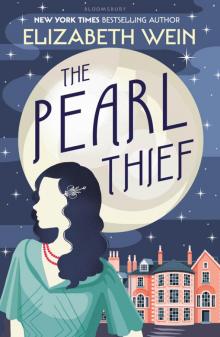 The Pearl Thief
The Pearl Thief Cobalt Squadron
Cobalt Squadron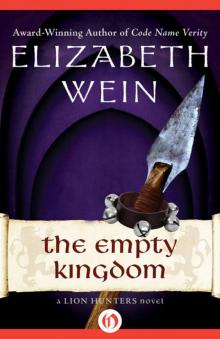 The Empty Kingdom
The Empty Kingdom Code Name Verity
Code Name Verity Rose Under Fire
Rose Under Fire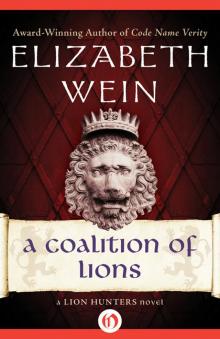 A Coalition of Lions
A Coalition of Lions Black Dove, White Raven
Black Dove, White Raven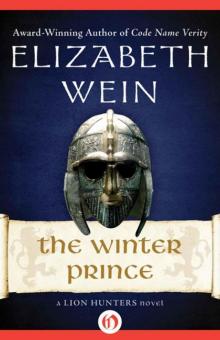 The Winter Prince
The Winter Prince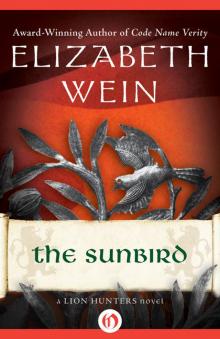 The Sunbird
The Sunbird